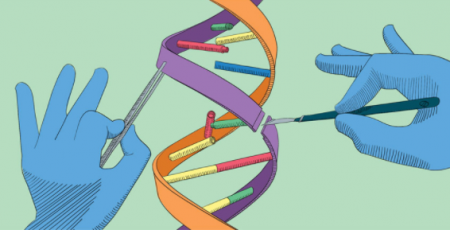In the recent times and years to come, the application of technology to make human life seamless will be the key purpose. The issues surrounding our human existence like human rights, justice, equality, etc. are being taken up and to find their solutions, sophisticated technology is developed.
DNA Technology is one such technology in which information derived by DNA can conclusively and accurately provide results. DNA samples can be taken from hair, blood, etc.
The DNA Technology Regulation Bill 2019 is brought in with a purpose to strengthen and support our justice delivery system, this bill proposes to use DNA technology based forensic techniques to solve crimes for example finding missing persons or to identify remains at crime scene. It does so by establishing the identity of individuals.
DNA as an evidence is considered as an evidence since 1985, so it is a step forward in this regard. The use of DNA testing has been in use for criminal investigations, establishment of parentage, etc. But this bill provides a supervisory control over these practices in a structured manner.
Some of the key highlights of the bill are:
- To set up National Data Bank at the national level and Regional DNA data banks at the state level to maintain indices of information on crime scene, undertrials, missing persons, unidentified human remains, etc.
- A provision for punishing the people who indulge in leaking DNA profiling to people or entities who do not have authorization or are not entitled to have it is also present. Punishments up to three years of jail and 1 lakh rupees fine is provided.
- The bill suggests that the DNA information including profiling, samples, etc. will only be used for the purpose of identification and not for any other purpose.
- The bill enables cross-matching of people who are missing and the ones who are found dead or could not be identified.
- A DNA Regulatory Board is to be established as per the bill which will accredit the DNA laboratories which will establish identity of individuals.
- The DNA laboratories will share data with the national and regional data banks.
- It also provides for storing unique genetic information for administrative purposes.
Benefits
The provisions make it clear that the bill will make the process of justice delivery faster. The DNA banks will provide a repository of suspected people who are habitual offenders therefore, easy to identify.
Moreover, it will help to find the missing children in India. Around 1,00,000 children in India go missing annually.
It will also ensure that the collected data is not abused and misused therefore protects the interests of individuals- For example, a written consent will be required before collecting data of a person (not required if punishment of seven or more year or a death sentence has been awarded).
The setting up of accredited laboratories and subsequent sharing with national/regional data banks will make the process transparent. Also, only the information will be stored that is required for establishing the identity of an individual.
Global Scenario
DNA testing for criminal investigations has been adopted by various countries. According to US Interpol’s Global DNA Profiling Survey Results 2016, as many as 69 countries have a national DNA database, including the USA, Canada and China. Every country follows its own set of rules and laws.
Concerns
But, wherever there is a proposal which involves storing personal data of individuals, human rights activists often express their concerns. It also raises ethical concerns as people might not be aware that their sensitive data might be used for commercial and surveillance purposes.
These concerns have been raised also because India does not have a strong Data Protection law yet and DNA bill will therefore have no check on the concerns of privacy. Right to Privacy is a fundamental right as observed by the Puttaswamy and Subramanian Swamy judgments. Therefore, collecting such personal data goes against the right to privacy.
Moreover, in today’s charged atmosphere, some groups are worried that it will lead to communal profiling of certain groups. DNA contains tremendous amounts of information like susceptibility to diseases, if such information is derived from the samples, it will lead to unnecessary isolations and harassment of people. For eg. People with HIV/AIDS.
Storing such huge amount of data into databases come with its own set of issues- cost effectiveness of maintaining large databases; making it fool-proof; challenges like hacking and stealing of data and subsequent leaking.
Although there is a provision of consent but magistrate can easily override such consent. Therefore, making it redundant.
Solutions
So, to address the concerns while efficiently and ethically using the DNA information, a comprehensive Data Protection Law is required which addresses this issue. Moreover, technologies which provide better security like hash graphs which are even one step ahead of blockchain can be used.
Therefore, it is required that a right balance is maintained between the Right to justice and Right to Privacy.
Author: Suramya Sharma
Category: Science & Technology
